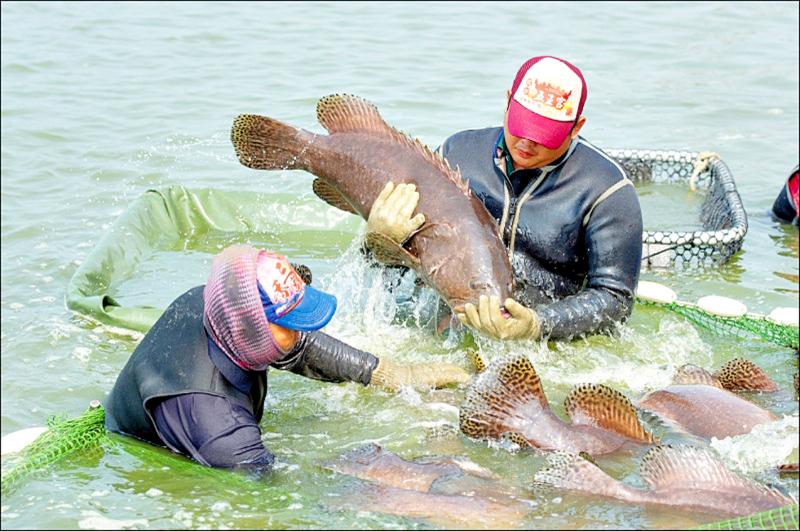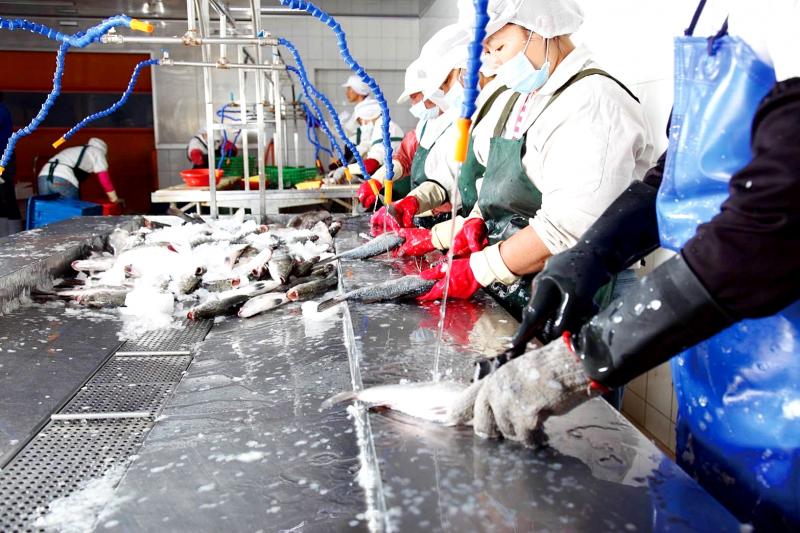Last month China lashed out at Taiwanese agricultural exports again, banning grouper imports. This event marked the ignominious end of what was once the star agricultural product of the ill-starred Economic Cooperation Framework Agreement (ECFA). Local media quoted the Fisheries Agency as saying it was a turning point in Taiwan’s grouper history.
Spurred by the signing of ECFA, by the spring of 2011 grouper had become the leading agricultural export, driving profits for middlemen and food price inflation. Grouper exports were among the few products whose market grew, enabling then-president Ma Ying-jeou (馬英九) of the Chinese Nationalist Party (KMT) to claim that agricultural exports to China had risen in the wake of ECFA.
Grouper exports were so promising that private equity firms switched from investments in chip production to investing in grouper product, processing and shipping, the media reported at the time. In September 2011, the KMT administration announced the completion of a government-funded grouper export ship, an excellent example of how politically-connected firms have their profits internalized but their costs socialized.

Photo: Yang Yuan-ting, Taipei Times
We have grown so used to ECFA’s destructive effects (may whatever churlish gods rule this earth curse forever the gullible media who ran paeans to it before its signing) that we have forgotten about them. In Taiwan, cash crops for the Chinese market replaced food crops, increasing the nation’s dependence on China, and inviting all the other pernicious colonial effects of cash crops.
The early harvest soon wilted as well. As Commonwealth magazine reported in 2014, “the market share of the 539 Taiwanese cross-strait export items on the reduced tariffs list has declined in each successive year since ECFA.”
As numerous media organs reported, China made real inroads into Taiwan’s markets, while Taiwan made few genuine gains, many of them markets created by Beijing’s political orders of Taiwanese agricultural products, rather than growing out of some market superiority of a Taiwanese producer.

Photo courtesy of Kaohsiung City Hall
The rise in grouper was part of a strategy to build Chinese-focused political networks in southern Taiwan and to build its own industries. The profits went, predictably, to politically-connected big processors and shippers, the “grouper kings” as the 2014 piece in Commonwealth called them, not to the small farmers.
In response to the demand from China, Taiwanese exporters shifted from abalone to grouper (in the north this was partly driven by a disease that hit abalone production in 2010). What got a boost? Well, abalone production in Pingtan, the industrial area that China erected specifically to poach technology from Taiwan, increased.
The current ban on grouper was foreshadowed near the end of last year when China announced that it had found forbidden chemicals in grouper shipments from Taiwan. As the New York Times reported, some grouper producers took the hint and switched away from grouper.
It may not be true that the ban last month was triggered by forbidden chemicals, but there was no question that, as the Chinese pointed out, some of the grouper in the shipments they investigated came from sources that were not licensed to export it to China.
The local media reported that there are roughly 2,000 grouper farms, but only 458 are licensed for export. Since the profit on a grouper shipment can reach NT$10 million, it was reported, but fines for license violations are a pitiful NT$150,000, shippers simply shrug at the regulations.
Beijing’s grouper ban highlights two major problems of Taiwan’s cross-strait and foreign relations. First, it shows how Taiwan’s utter failure to punish violators of laws and regulations negatively impacts its export economy and its foreign policy, leaving it vulnerable to punishments and undercutting its displays of righteous indignity.
SCAMMERS AND SHADY LINKS
Readers may recall the deportation of the scammers from Kenya to China in 2016. The government had failed to punish scammers deported back to Taiwan, driving China to finally take action against Taiwanese scammers. Taiwanese fishermen are notorious across the Pacific and elsewhere, yet the government has consistently dragged its feet on regulating them.
Consider also the shady links between Taiwanese businessmen and North Korea and Iran. Taiwanese businessmen have been arrested on several occasions for shipping forbidden weapons and machinery to those nations. Taiwan’s export controls have been the subject of much criticism from abroad.
A 2017 report from the Middlebury Institute of International Studies at Monterey drily noted the “punishment” for a pair of businessmen for shipping NT$10 million worth of technology items to North Korea in 2006-7: “The court sentenced Liu to 115 days in jail and Chen to 100 days in jail and two years of probation, and it fined Royal Team Corporation NT$50,000. The sentences for both individuals were commutable to a fine at the rate of NT$1,000 per day.”
This pattern is common across all punishments for Taiwanese businessmen, for both domestic and international crimes. Periodic violations like this do not reflect well on Taiwan and are not well received abroad.
TECHNOLOGY APPROPRIATION
The second issue the grouper export ban highlights is the appropriation of Taiwan’s technology and markets by China. The media quickly recalled the seemingly arbitrary ban on Taiwanese pineapples. In fact, pineapple shipments had boomed because China had effectively banned Philippines pineapples in 2012. Taipei’s gains had come at Manila’s expense.
Lost amidst all the cluck-clucking at Taiwan for developing that dependency on China was that China had quietly announced developments in its own production of pineapple, the third most-important tropical fruit in China after bananas and mangos. Many of the pineapples cultivated in China are varieties developed in Taiwan, especially the well-known “Tainung” series.
It is highly likely that the pineapple scenario is being repeated here. For more than a decade China has been pushing its local fish farmers to put less stress on the environment, and the government has promoted grouper production. After 2016, grouper production began to climb steadily.
In May, China announced the launch of the world’s biggest fish farm ship, with three more in the class to follow, signaling its growing prowess in fish production technology.
According to experts cited in the media, the ship will focus on the production of high value species, including (of course!) grouper.
It appears that the Chinese waited until their own technologies had matured and they had mastered the supply and processing technologies of the Taiwanese, then announced a ban. This will cause supply from Taiwan, usually the world’s biggest grouper producer, to plummet, and force farmers to turn to other products. China will then take over Taiwan’s markets.
The New York Times report said that, in response, some of the local farmers are thinking of ramping up production of the four-finger threadfin fish, whose largest market is China.
Notes from Central Taiwan is a column written by long-term resident Michael Turton, who provides incisive commentary informed by three decades of living in and writing about his adoptive country. The views expressed here are his own.

March 10 to March 16 Although it failed to become popular, March of the Black Cats (烏貓進行曲) was the first Taiwanese record to have “pop song” printed on the label. Released in March 1929 under Eagle Records, a subsidiary of the Japanese-owned Columbia Records, the Hoklo (commonly known as Taiwanese) lyrics followed the traditional seven characters per verse of Taiwanese opera, but the instrumentation was Western, performed by Eagle’s in-house orchestra. The singer was entertainer Chiu-chan (秋蟾). In fact, a cover of a Xiamen folk song by Chiu-chan released around the same time, Plum Widow Missing Her Husband (雪梅思君), enjoyed more

Last week Elbridge Colby, US President Donald Trump’s nominee for under secretary of defense for policy, a key advisory position, said in his Senate confirmation hearing that Taiwan defense spending should be 10 percent of GDP “at least something in that ballpark, really focused on their defense.” He added: “So we need to properly incentivize them.” Much commentary focused on the 10 percent figure, and rightly so. Colby is not wrong in one respect — Taiwan does need to spend more. But the steady escalation in the proportion of GDP from 3 percent to 5 percent to 10 percent that advocates

From insomniacs to party-goers, doting couples, tired paramedics and Johannesburg’s golden youth, The Pantry, a petrol station doubling as a gourmet deli, has become unmissable on the nightlife scene of South Africa’s biggest city. Open 24 hours a day, the establishment which opened three years ago is a haven for revelers looking for a midnight snack to sober up after the bars and nightclubs close at 2am or 5am. “Believe me, we see it all here,” sighs a cashier. Before the curtains open on Johannesburg’s infamous party scene, the evening gets off to a gentle start. On a Friday at around 6pm,

A series of dramatic news items dropped last month that shed light on Chinese Communist Party (CCP) attitudes towards three candidates for last year’s presidential election: Taiwan People’s Party (TPP) founder Ko Wen-je (柯文哲), Terry Gou (郭台銘), founder of Hon Hai Precision Industry Co (鴻海精密), also known as Foxconn Technology Group (富士康科技集團), and New Taipei City Mayor Hou You-yi (侯友宜) of the Chinese Nationalist Party (KMT). It also revealed deep blue support for Ko and Gou from inside the KMT, how they interacted with the CCP and alleged election interference involving NT$100 million (US$3.05 million) or more raised by the